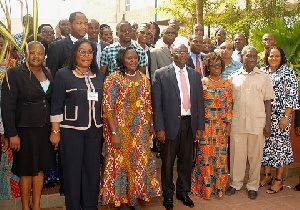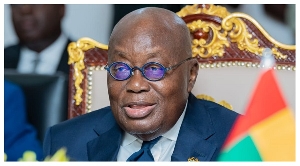- Home - News
- TWI News | TV
- Polls
- Year In Review
- News Archive
- Crime & Punishment
- Politics
- Regional
- Editorial
- Health
- Ghanaians Abroad
- Tabloid
- Africa
- Religion
- Election 2020
- Coronavirus
- News Videos | TV
- Photo Archives
- News Headlines
- Press Release
General News of Saturday, 4 February 2017
Source: Ghanaian Times
We’ll stamp out corruption, tax evasion - Veep
Vice-president Dr. Mahamudu Bawumia has said government is to develop a beneficiary ownership regime to identify real owners of companies, as part of measures to fight corruption.
He explained that the regime which would cover the extraction sector to stamp out corruption and tax evasion had become necessary because the country risked losing out, as extractive assets might be misallocated for corrupt reasons.
Dr. Bawumia was speaking at a forum in Accra on Beneficial Ownership Transparency which brought together key stakeholders from civil society, government, business and law enforcement to collaborate and progress plans on how to collect, share and use beneficial ownership information to tackle ownership.
The beneficial ownership regime, when developed, will create a mechanism that will enable the government to capture ownership of divested companies as well as companies bidding for contracts, especially in the extractive industry.
This will help prevent situations where companies are given extractive projects because their owners are politically connected, or because their owners are willing to engage in questionable deals aimed at generating quick profits.
Dr. Bawumia said the need for the implementation of beneficiary ownership was given rise due to the Panama Papers which revealed world-wide corruption.
According to the Vice-President, about US$1.2 trillion is paid annually as bribe while poor countries around the world lost US$170 billion to tax evasions. He expressed the government’s commitment to provide the needed resources to ensure the full implementation of Beneficiary Ownership and Contract Transparency, Transparency in Procurement Processes, among others.
The Vice-president said there were a number of international obligations the government must meet regarding the implementation of a beneficiary ownership regime.
For instance, he said the Ghana Extractive Industry Transparency Initiative, Open Government Partnership and the Financial Intelligence Centre must be meet Beneficiary Ownership requirement deadlines.
He said Ghana, compared to its neighbours, had significant progress and indicated that consultative workshops had been organised for state and non-state actors in anti-corruption.
Also, he said the country’s Companies Act had been amended to make provision for the implementation of beneficiary ownership.
“There is a huge financial implication to our already constraints fiscal space. But we will put in place an efficient Beneficiary Ownership regime. The identity and details of politically exposed persons and their families would be made accessible and the issue of security would be key,” he said.
He expressed the government’s commitment to fight corruption and indicated that the Right to Information law, the establishment of Special Prosecutor’s Office, and the amendment of the Criminal Code to make corruption a felony instead of misdemeanor would be pursued by the government this year.
The Executive Director of Ghana Integrity Initiative, the local chapter of Transparency International, Mrs. Linda Ofori-Kwafo, called for more sanctions as means of fighting corruption.
“Any government that is serious and committed in the fight against corruption must sanction perpetrators seriously,” she said.
The Board Chairman of the Ghana Integrity Initiative, Mr. Kwame Gyasi, said the workshop would build the capacity of key stakeholders from civil society organisations, government functionaries, business community, among others on how to collect, share, and use information to fight corruption.
He said Ghana Integrity Initiative would continuously create awareness about the negative effects of corruption and empower citizens to demand transparency from both public and private institutions.











